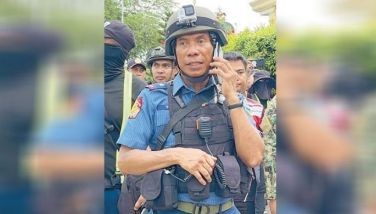Kangaroo court

I think it is about time the Commission on Human Rights issue an opinion on the Senate’s practice, under the guise of “hearings in aid of legislation”, of arrogating unto itself the roles of judge, jury and executioner.
The instrument of a “public hearing” has not only been overused by the senators lately. That instrument has been abused.
The public hearing has been reduced to a kangaroo court where people are called in, berated in primetime television, prejudged, and then condemned via trial by publicity. The Senate has, of late, also fallen into the habit of casually ordering people arrested and detained in the chamber’s premises.
This, clearly, has become a human rights concern.
What has given the senators the right to constitute themselves into the new Inquisition where, supposedly “in aid of legislation”, they so freely prejudge issues they have not even begun to properly investigate, pressure “witnesses” to implicate themselves according the senators’ prejudgment, threaten them detention if they do not, and then freely issuing out soundbites to the media at the expense of those roundly accused but not accorded equal time to defend themselves.
In the process, the Senate elbows out the regular investigative and supervisory units and weakens the importance of the court process. And all to enable politicians to score political points, win media face time and improve their name-recall ratings.
Whenever politicians, using their privileges, crowd out our regular public institutions for conducting inquiry and prosecution, they distort the proper development of our democratic institutions. Needless to say, they freely toy with the rights of those accused in trials by publicity.
Take the case of the marathon hearing conducted on JocJoc Bolante. For ten wasted hours, senators interrogated the witness, freely editorialized on what the witness said and attempted to make him say things to the senators satisfaction. In the end, no new information was produced to add to what the committee report on the same matter arrived at three years ago.
The whole exercise was a waste of time. The public pays dearly for that wasted workday of senators who benefit from generous allowances and fatty allocations for their pork barrels.
Or, take the more recent hearing featuring retired PNP comptroller Eliseo de la Paz and the 105,000 euros he was found carrying as he exited Moscow.
Long before this spectacle was conducted in the Senate, the National Police Commission concluded, after careful investigation, that the retired officer be charged for malversation of public funds, for violating the anti-graft and corrupt practices act and for violating the Bangko Sentral Act. The charges are being readied to be filed in the appropriate courts and supervisory authorities.
In addition to those who went to Moscow, the PNP has readied administrative cases against senior officers responsible for allowing the money to be drawn from the vault of the PNP Directorate for Intelligence. The members of the delegation have all been ordered to return even the money officially released for their travel and then await proper reimbursement only after clearance by the COA.
The hearing featuring de la Paz is the second hearing on the matter. The first one, held October 23, resulted in the hurried preparation of a committee report on the issue. The report was hurried to enable Sen. Miriam Santiago to leave for New York for what turned out to be a failed bid to be elected to the International Court. It is not clear if that trip was classified official travel and paid for by the Senate.
After the October 23rd hearing, Sen. Santiago, without any factual basis for doing so, implicated PNP chief Jesus Verzosa and DILG Secretary Ronaldo Puno in the case of the intercepted euros. Every other investigation demonstrated that the retired police comptroller had, in a highly irregular manner, drawn what he calls a “contingency fund” from the vault of the PNP Directorate for Intelligence.
Before the de la Paz hearing, several senators were already peddling the unwarranted conclusion that the retired police officer was merely the fall guy for higher officials. No shred of evidence would support this.
In the course of the hearing, Sen. Santiago, by some bizarre twist in logic, arrived at the conclusion that since the money was taken abroad by the delegation but not spent, the intention must have been to deposit the said funds on behalf of someone else. This despite the received testimony that the PNP disbursing officer had officially informed his immediate superior of the withdrawal of the said funds. Therefore the funds will have to be accounted for at some point.
Sen. Manuel Roxas, in the course of this show trial, allowed himself to draw the conclusion that the PNP’s attendance in the Interpol meeting was plain junketing. Being vice-chairman of the Senate foreign relations committee, that is a pretty irresponsible thing to say. Roxas fails to mention that, at about the same time the Interpol summit was held, several senators were also in Russia for reasons not reported to us.
The Interpol is the main framework for cooperation against global terrorism and transnational crimes. Furthermore, the PNP delegation was there to help elect the Singaporean police commissioner as the new president of the Interpol. That was a necessary gesture — in fact, an obligatory one — in the spirit of Asean solidarity.
In the end, this second marathon Senate hearing in a week did not produce any new information. In all likelihood, the Senate will arrive at exactly the same charges recommended by the official Napolcom investigation into the matter — and to which de la Paz himself had admitted culpability.
All the Senate hearing accomplished, apart from winning some television face time for the senators, was to spend probably more than the amount of euros intercepted in Moscow in an obviously redundant exercise. What a waste.
- Latest
- Trending





























